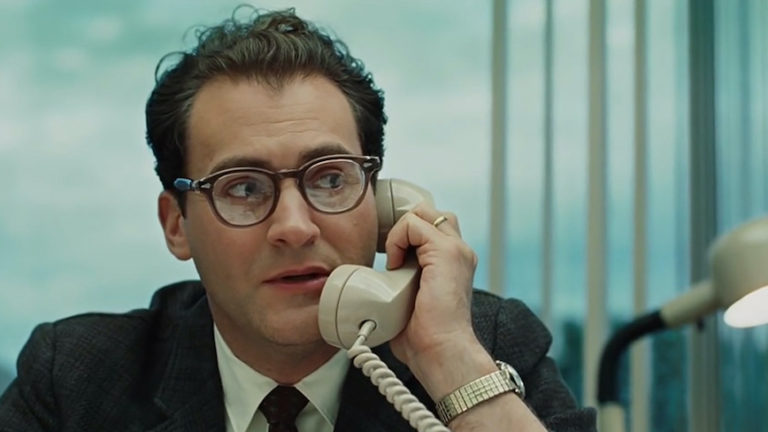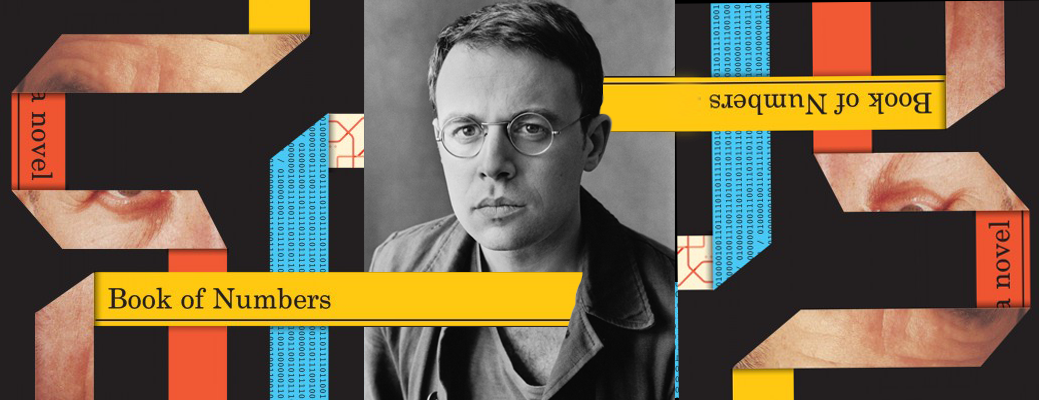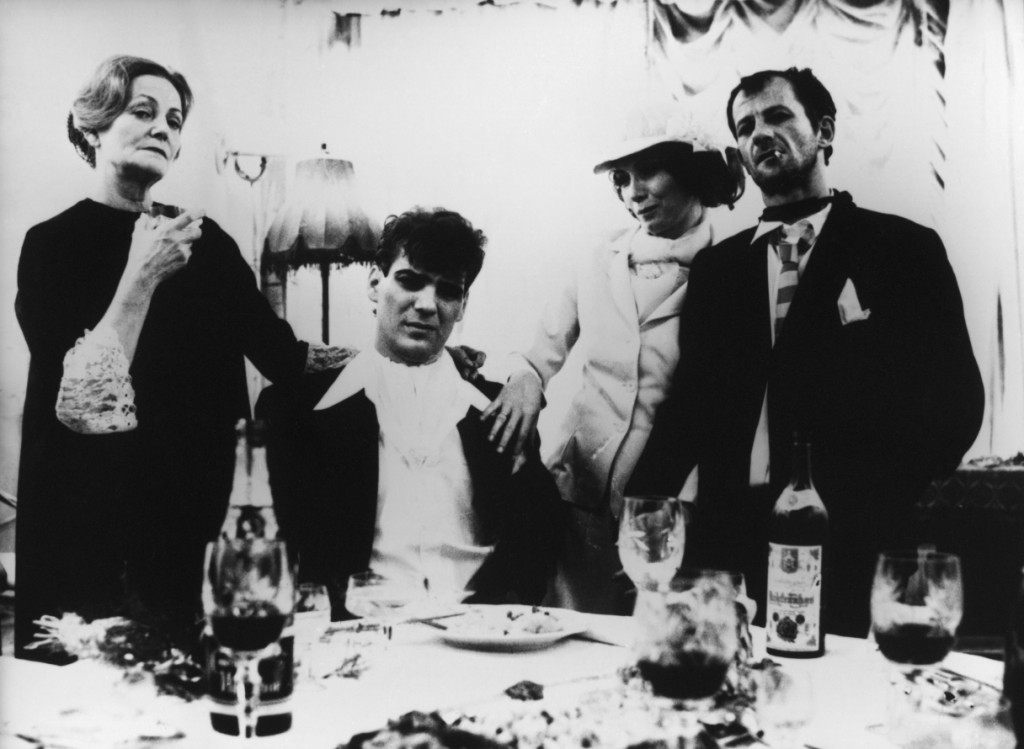On November 2, on the eve of the 2020 Presidential Election, a tweet went viral. It was a picture of the electoral map, noting each state’s obtainable votes—though rather than shaded red or blue, they were all colored a light teal, overlaid with a photo of Fred Melamed from the film A Serious Man, flashing his quixotic grin. The caption read: “And the winner is…Sy Ableman???”
The tweet was a joke, and a good one at that—a reference to the 2009 film by the Coen brothers that has achieved something of cult status since its quiet release over a decade ago: two Academy Award nominations in 2010, for Best Picture and Best Original Screenplay, both of which were lost to The Hurt Locker. And though the replies to the Election Day tweet were littered with other lines from the imminently quotable film, the joke portrayed a semblance of truth, as any strong joke will. As our nation waited with bated breath to see if we’d be plunged further into the abyss, or if we could potentially pull ourselves back from the brink, it wasn’t outside the realm of possibility that the result might be a third, cruelly absurd outcome—one that we hadn’t anticipated with our comfy intellect. It would be par for the course for the last five years.
To regard the Coen brothers as ahead of their time—ahead of the present, as they’re still working directors (most recently with The Ballad of Buster Scruggs, for Netflix)—is to presume that a day will come in which more films look like Coen brothers films. This is doubtful. Rather, their oeuvre stands outside of all connotations: a singular voice, which is doubly strange because they’re a duo (though they are often considered one person—it is said that you can ask them both the same question and receive the same answer). What’s stranger is that their films look like regular films: they portray lived-in people doing lived-in things, so much so that their peculiarity can at times be overlooked—think David Lynch with a muzzle on. Occasionally, their films have even crossed over with mainstream audiences: both Fargo and No Country for Old Men garnered heavy Oscar attention, with the former considered among the greatest films ever made. This is likely due to the Coens’ appreciation for cinema writ large: their movies tend to be either strict genre exercises or meditative comedy-dramas that eschew the genre framework they previously adhered to. It’s in the latter that they truly shine, in my belief, though the Coens seem indifferent to such reception. Unlike Spielberg’s credo that he makes “one for me, one for them,” the Coens’ movies feel completely self-motivated—and if they happen to strike a chord with the masses, so be it. One only has to view pictures of them with their awards to glean that they don’t really care—in fact it often looks as if they aren’t even sure what they’re holding.
Thus is the case with A Serious Man, which arrived on the momentum of 2007’s No Country for Old Men (with Burn After Reading released in-between, as if to throw casual fans off their trail). In typical Coen fashion, the film was a stark left turn: no notable stars—no brooding Oscar Isaac or dancing Channing Tatum, no fist-pumping Brad Pitt or chilled Jeff Bridges—instead favoring newcomer Michael Stuhlbarg, known mainly for his stage career; and a setting so niche that even admirers of the ultra-specific Minnesotan rendering in Fargo had to be skeptical. One senses that the Coens perhaps leveraged their fresh Best Picture win to make what reads like a personal film: a story set in a Jewish suburb of Minneapolis in the late 1960s—where and when the Coens grew up. Here, more than in any other Coen brothers film, is a sharp attention to detail, likely because these details are ripped from their lives. Seeing the film for the first time, my father was amazed at the level of accuracy, having also grown up in a Jewish suburb (watching a character practice his Torah portion with a record, running the needle back to mimic the rabbi’s exact intonation, he commented: “I did the same thing”).
Also working against the film was its marketability. The trailer centered around an image of Melamed knocking Stuhlbarg’s head against a blackboard—the single instance of action in the film, and one that bears little consequence over the story. Rather, the plot concerns Larry Gopnik (Stuhlbarg), a professor on the precipice of a promotion, with a son two weeks away from a Bar Mitzvah. His life is seemingly normal—mundane even, though Larry appears content with this—until all of the sudden it isn’t. His wife announces that she’s leaving him for Sy Ableman, who is determined to drag Larry through a sequence of frustrating rituals. His office begins receiving unsolicited letters advising the administration not to grant him tenure. A disgruntled student attempts to bribe him for a passing grade, then denies doing so in a number of Kafkaesque conversations. His brother—a jobless mathematician writing a probability matrix, if you can call it that—won’t stop draining his cyst in the bathroom. There’s this, and then a host of other difficulties—property lines come into play, of course—while Larry can’t help but wonder why this is happening to him, what he’s done to deserve it. In a series of encounters—with lawyers, with rabbis, with his spinster neighbor—Larry attempts to elicit meaning from his sudden descent. Is God trying to teach him something? If so, what is it? And if not, why provide these questions but not the answers?
A Serious Man masks itself as a comedy. And it is, in many ways. It’s a raucously funny film, full of the Coens’ unusual characters—their casting director deserves a raise—and illogical dialogue; and Stuhlbarg is in full-form all the while, as if he inherently understands what the role requires of him—watching the film upon its release, I was astounded that such a new presence in cinema could command so much of the screen, in a part that’s essentially demanding him to simulate the opposite. But perhaps the lack of overarching praise reflects the film’s central conceit: it doesn’t offer the gooey core we tend to want in our stories—I’ve often considered it the B-side to Fargo, discounting the Marge/Norm relationship that gives that narrative its emotional sweetness. In this way, A Serious Man is unrelenting in its endeavor: it’s shot plainly, unassumingly, but it piles the external stress on Larry’s plate until his internal agony takes over: he’s experiencing not so much a crisis of life as a crisis of faith; and it is in this dearth of answers that he faces the most misery, circling the drain of disillusionment as his world tears asunder.
It may be considered a spoiler, but the film doesn’t deliver the answers either. In fact, one leaves as distressed as Larry; an advertising campaign featured the phrase What does it all mean? as if the film would respond to this inquiry. But it doesn’t: it offers suggestions of meaning—it’s been commented that the story is a modern retelling of the Book of Job, which features a similar loading of problems upon its titular character; there are references to Schrödinger’s cat and other philosophical concepts that flutter about the film’s edges. But in the end it leaves us unsatisfied. There is a conclusion—one that I won’t give away, beyond saying that I find it perfect—though I imagine it strikes people as additionally puzzling. Audiences are required to either throw up their hands and cast the movie aside, or circle back to search for those same answers.
This, ultimately, is what makes A Serious Man a tragic film: we find ourselves in the same position as our protagonist, unable to make sense of all that transpires around us. I presume that those who have never questioned their existence find A Serious Man a serious bore; or they find it amusing and quotable, and not much more. But for anyone else, despite the quirky setting, Larry’s struggle feels noticeably prescient: “Everything that I thought was one way,” he confides to a friend midway through the film, “turns out to be another.”
Which brings me back to the Ableman tweet. When I saw A Serious Man, in 2009, I had no idea what my life would look like—I wasn’t thinking about it, surely; but if I had, it wouldn’t have looked like this. Many people have expressed a similar sentiment in the past few years: that our society is unrecognizable, that never in their wildest dreams could they have envisioned such upheaval—that things they thought were one way turned out to be another. Every headline seems to transmit from a different reality: a pandemic causes a global shutdown, with no end in sight; a gang of insurgents attacks the Capitol, provoked by the theoretical leader of said country; a milquetoast actor is revealed to have cannibalistic tendencies. One day we were living our lives, and the next we were dropped into a confluence of questioning. Why is this happening to us? We haven’t done anything. Are we being punished? What meaning can be derived from such disaster? There must be a reason—there must be a hand at the wheel of our collective narrative. Because if there isn’t, then what are we even doing here?
I don’t offer A Serious Man as a solution. In fact, I find it annoying when writers struggle to construct a scaffold around our moment in history—this is not who we are, we learn from our darkest hour, etc. I’ll also stop short of suggesting that A Serious Man provides solace: watching a comedy about a man’s similar disenchantment, packaged in a ridiculousness that only the Coen brothers are capable of creating, is at least a means of feeling less alone—we’ve seen such fables expressed as art, and therefore can identify in a shared consciousness of human experience. This is as simple a conclusion as the one A Serious Man casts aside, and I like the film far too much to reduce it to cliché.
Instead, I now see the film as a mirror: one that we can both commentate on and identify in—one that we can both laugh at and laugh with. Larry’s helplessness is our own helplessness; his voyage is our voyage; the futility of his efforts, and ours, is the human condition. To deduce meaning in A Serious Man—or really any Coen brothers project—is to miss the point; rather, the open-ended events of the movie and the open-ended events of our lives inspire us to ask these questions. They remind us that these questions are worth asking if only because they are unavoidable. And in the meantime, as one rabbi puts it to Larry: “Helping others…couldn’t hurt.” This line bothered me for years; I felt as unfulfilled as Larry, as I assumed the Coen Brothers wanted me to feel. Now, though, it strikes me as good advice.
As so, as we find ourselves confronted with the harsh reality of our surroundings—to say nothing of climate change, which haunts us as a specter of annihilation—it feels quite comforting to gaze into this mirror, provided by two oddball brothers, filmmakers who likely didn’t see this coming but at least had the insight to envision our response. I won’t give away how Larry makes out, but I will say that I hope we fare better, or can somehow settle into our discomfort with this uncertainty. Or, as the disgruntled student’s father puts it to Larry: “Please, accept the mystery.” Though I’ll admit I’m still working on that.




